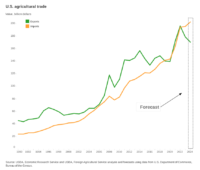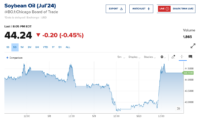Bloomberg's Clarice Couto reported this past Friday that "a surprising tax change in agriculture powerhouse Brazil has the potential to make soy grown in the world’s largest bean exporter less…
Ukraine Planting: “Farmers Are Pushing Forward Wherever Possible”
Bloomberg News reported today that, “Ukraine President Volodymyr Zelenskiy is urging farmers to sow as many fields as possible to protect the food supply. But several of the nation’s largest agribusinesses say some plantings just won’t happen if Russia continues its war in Europe’s breadbasket.
“The country should organize a full-fledged sowing campaign in all of its territory ‘to the extent that’s possible,’ Zelenskiy said in a video released Friday. ‘All depends on people and the situation, because this is about life.’ His nation is the world’s second-biggest shipper of grains and biggest exporter of sunflower oil.”
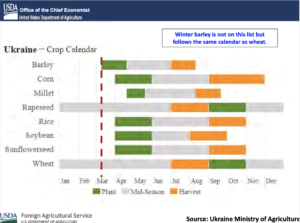
The Bloomberg article stated that, “One of Ukraine’s largest agricultural companies, UkrLandFarming, said a number of its company managers had been killed in Sumy in northern Ukraine, and in Kyiv.”
“IMC SA, another agricultural company, wants to keep its operations going, but it isn’t allowing workers into many fields because of worries about their safety, Chief Executive Officer Alex Lissitsa said Friday in an interview.”
“Farmers are pushing forward wherever possible. MHP SE, another major agribusiness, said 50,000 hectares of its land are occupied by Russian artillery, but it plans to sow the rest of its fields in two weeks if nothing changes,” the Bloomberg article said.
Yesterday, Reuters writers Maurice Tamman, David Gauthier-Villars, Sarah Mcfarlane and Sarah El Safty reported that, “The Russian invasion of Ukraine threatens millions of tiny spring-time sprouts that should emerge from stalks of dormant winter wheat in the coming weeks. If the farmers can’t feed those crops soon, far fewer of the so-called tillers will spout, jeopardizing a national wheat harvest on which millions in the developing world depend.
“The wheat was planted last autumn, which, after a brief growing period, fell dormant for the winter. Before the grain returns to life, however, farmers typically spread fertilizer that encourages the tillers to grow off the main stalks. Each stalk can have three or four tillers, increasing the yield per wheat stalk exponentially.
But Ukrainian farmers – who produced a record grain crop last year – say they now are short of fertilizer, as well as pesticides and herbicides. And even if they had enough of those materials, they can’t get enough fuel to power their equipment, they add.
The Reuters article pointed out that, “International food and feed prices could rise by up to 20% as a result of the conflict in Ukraine, triggering a jump in global malnourishment, the United Nations food agency said on Friday.”
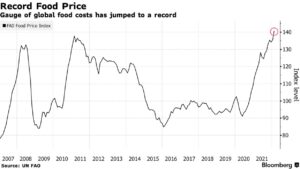
Also yesterday, Bloomberg writers Elizabeth Elkin and Tatiana Freitas reported that, “Fertilizer prices continue to surge as supply upheaval from Russia leaves governments struggling to secure vital crop nutrients, adding to concerns that record global food inflation will accelerate.
The Green Markets North American Fertilizer Index jumped 16% Friday to a new high. Prices for the widely used nutrient urea in New Orleans soared 22%, also reaching a record. And an index for potash in Brazil rocketed a record 34%.
Meanwhile, Bloomberg writer Irina Anghel reported yesterday that, “Germany wants to roll back some environmental policies in order to boost domestic crop production as Russia’s invasion of Ukraine threatens global grain and oilseed supplies.
“The country will allow farmers to sow crops for feed in previously ecologically protected areas, and will step up its strategy to increase the competitiveness of domestic, protein-rich legumes such as peas and broad beans, the German agriculture ministry said. The measures should help meet regional feed demand, cushion the impact of farmers’ surging input costs and ensure self-sufficiency.”
And Bloomberg writer Nicholas Larkin reported yesterday that, “Global crop trading has been roiled after Russia’s invasion of Ukraine paralyzed crucial Black Sea supplies, and now there’s another threat building: Food protectionism.
“With prices of key staples spiking, governments are starting to take steps to safeguard domestic supplies and keep costs in check for their people. Among the list, Moldova, Hungary and Serbia have banned some grain exports, while edible oil giant Indonesia is tightening controls over palm oil shipments.”
In a statement yesterday, G-7 agriculture ministers noted in part that, “We call on all countries to keep their food and agricultural markets open and to guard against any unjustified restrictive measures on their exports.”
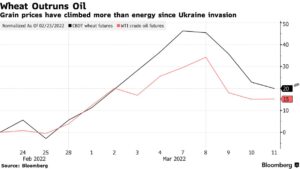
Regarding commodity prices, Dow Jones writer Kirk Maltais reported yesterday that, “Wheat for May delivery rose 1.8% to $11.06 1/2 a bushel on the Chicago Board of Trade Friday, even with the scramble to lock in alternatives to Russian or Ukrainian wheat starting to subside, [while] corn for May delivery rose 0.9% to $7.62 1/2 a bushel, [and] soybeans for May delivery fell 0.6% to $16.76 a bushel.”






